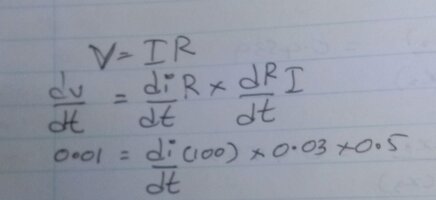You are using an out of date browser. It may not display this or other websites correctly.
You should upgrade or use an alternative browser.
You should upgrade or use an alternative browser.
Using Ohm's Law V=IR, find dI/dt when R=100 ohm, I=0.05 A
- Thread starter PA3040D
- Start date
topsquark
Senior Member
- Joined
- Aug 27, 2012
- Messages
- 2,307
You have two time rates of change given and you want the time rate of change of the third. Why not take the time derivative of each side?Please help to solve this question
View attachment 35541
[imath]\dfrac{dV}{dt} = \dfrac{d}{dt} (IR)[/imath]
Give it a try and if you still having problems, post what you get.
-Dan
Dear Sir,You have two time rates of change given and you want the time rate of change of the third. Why not take the time derivative of each side?
[imath]\dfrac{dV}{dt} = \dfrac{d}{dt} (IR)[/imath]
Give it a try and if you still having problems, post what you get.
-Dan
Grate thanks for the help
Can you please help me a bit little ahead
Thanks in advanced
Harry_the_cat
Elite Member
- Joined
- Mar 16, 2016
- Messages
- 3,760
1. Apply the Product Rule to find \(\displaystyle \frac{dV}{dt}\) given that \(\displaystyle V=IR\).
2. Then look at what you are given, eg you are given \(\displaystyle \frac{dR}{dt}=0.03\) ohms/s and what else?
3. And look at what you are asked to find, ie you are asked to find \(\displaystyle \frac {dI}{dt}\) for a given value of R and I.
As Topsquark said, give it a try, and ask for more help if you need it.
2. Then look at what you are given, eg you are given \(\displaystyle \frac{dR}{dt}=0.03\) ohms/s and what else?
3. And look at what you are asked to find, ie you are asked to find \(\displaystyle \frac {dI}{dt}\) for a given value of R and I.
As Topsquark said, give it a try, and ask for more help if you need it.
It is still complicated for me1. Apply the Product Rule to find \(\displaystyle \frac{dV}{dt}\) given that \(\displaystyle V=IR\).
2. Then look at what you are given, eg you are given \(\displaystyle \frac{dR}{dt}=0.03\) ohms/s and what else?
3. And look at what you are asked to find, ie you are asked to find \(\displaystyle \frac {dI}{dt}\) for a given value of R and I.
As Topsquark said, give it a try, and ask for more help if you need it.
Can you please solve the full question that I will be easy to understand
This is grate help for me
Yes ThanksI do not think you are ready for a course in differential equations because you seem to have trouble with basic differential calculus.
[math]y = uv \implies y’ = uv’ \text { PLUS } vu’[/math]
Can you check that it is correct right now
Attachments
topsquark
Senior Member
- Joined
- Aug 27, 2012
- Messages
- 2,307
If the voltage is decreasing, what is the sign of dV/dt?Yes Thanks
Can you check that it is correct right now
-Dan
Yes I got itIf the voltage is decreasing, what is the sign of dV/dt?
-Dan
Please check now it is correct
Attachments
topsquark
Senior Member
- Joined
- Aug 27, 2012
- Messages
- 2,307
Yes. Now finish it.Yes I got it
Please check now it is correct
-Dan
Thanks for grate helpYes. Now finish it.
-Dan
Harry_the_cat
Elite Member
- Joined
- Mar 16, 2016
- Messages
- 3,760
Be careful. I=0.05 not 0.5.
Also, it's "great" not "grate"!
Also, it's "great" not "grate"!
Are you believe that anything to be changed . Can you please pointed outIn you work from post #14 how are both the 3rd and 4th line both valid??
I did not get it , Can you please solve it all the steps for me . It is great helpThe 3rd line in the attachment (response# 13) is INCORRECT - and should be removed. The 4th line of that response is correct.
Steven G
Elite Member
- Joined
- Dec 30, 2014
- Messages
- 14,561
The derivative of f(x)g(x) is NOT f'(x)*g'(x).I did not get it , Can you please solve it all the steps for me . It is great help
Based on the what you had for the 4th line, why would you write line 3?





